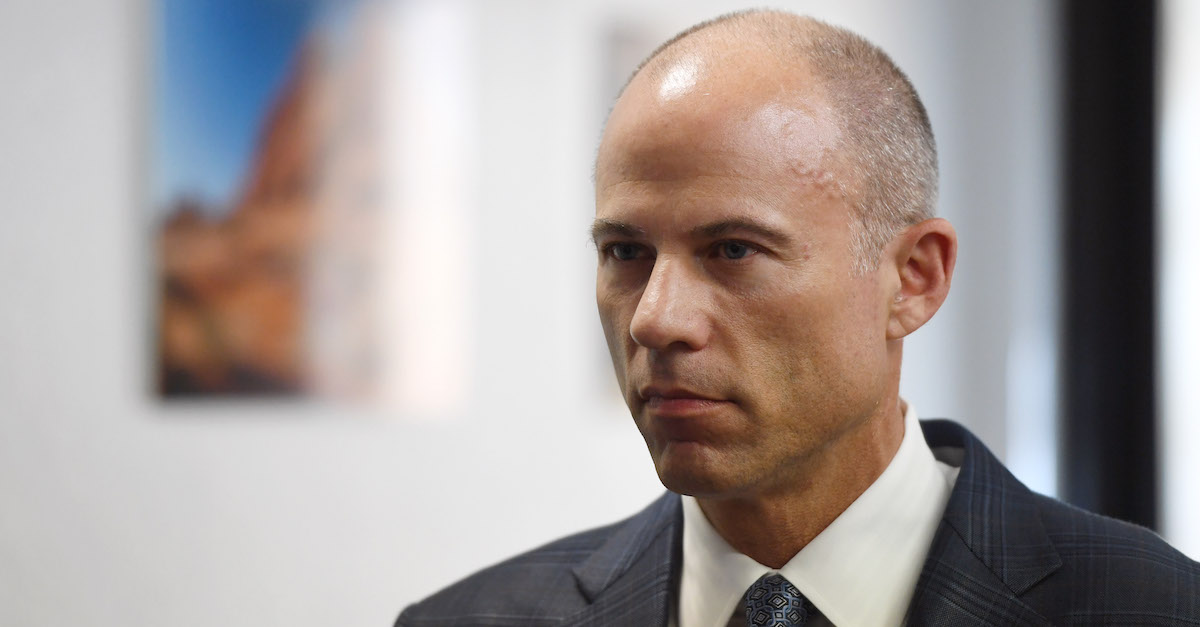
Stormy Daniels’ attorney Michael Avenatti late Sunday officially became a part of the ongoing Dr. Christine Blasey Ford–Brett Kavanaugh stand-off by alleging that he had “credible information regarding Judge Kavanaugh and Mark Judge.” It happened as the New Yorker published a story in which a second woman, Deborah Ramirez, accused President Donald Trump‘s Supreme Court nominee of sexual misconduct.
Avenatti said that he represented a woman who was not Ramirez who had information about Kavanaugh and Mark Judge. The latter was named by Ford as the drunk second person in the room when Kavanaugh allegedly attempted to sexually assault her at a high school party in the 80s. Judge has denied that multiple times. Avenatti then tweeted a screenshot of his email communication with Mike Davis, the chief counsel for nominations on the Senate Judiciary Committee.
Avenatti claimed to have “significant evidence of multiple house parties in the Washington, D.C. area in the early 1980s during which Brett Kavanaugh, Mark Judge and others would participate in the targeting of women with alcohol/drugs in order to allow a ‘train’ of men to gang rape them.” He also told CBS News that his unnamed client intends to go public this week.
Needless to say, Avenatti’s sudden involvement in all of this has elicited a mixed reaction online.
One of the reactions specifically regarded the explosive claims about “gang rape” and whether Avenatti was in jeopardy of committing an ethical violation. UNLV Law Prof. Ben Edwards tweeted that lawyers “cannot make factual claims like this about judges without evidence,” meaning that Avenatti would soon produce such evidence or potentially be subject to discipline.
https://twitter.com/BenPEdwards/status/1044046782123040768
Why? The American Bar Association (ABA) Model Rule 8.2(a) very clearly states that “a lawyer shall not make a statement that the lawyer knows to be false or with reckless disregard to its truth or falsity concerning the qualifications of a judge, adjudicatory officer or public legal officer, or of a candidate for election or appointment to judicial legal office.”
https://twitter.com/BenPEdwards/status/1044047783387258881
Prof. Edwards would add that this “isn’t the kind of allegation a lawyer who values her law license would make lightly” and that his “presumption here is that [Avenatti] has evidence for the claims.”
“If he doesn’t, he should be disciplined by the bar,” he added.
Edwards told Law&Crime that if it turns out that the claims “are not true or have no reasonable basis, the level of discipline would be set through the disciplinary process. There are not specific penalties for specific ethics rule violations.”
Avenatti, who is licensed to practice law in California, is subject to the ethics rules there.
As Edwards noted, the potential punishment depends on the rules of the state.
“The ABA Model Rules are a decent guide. California is the only state that has not enacted the ABA model rules in one form or another,” he said. “That said, the ABA model rules are extremely influential.”
It is currently true that California is not officially enforcing ABA-type ethics rules right now. Come Nov. 1, 2018, however, that is expected to change.
The California State Bar announced in May that it would be adopting ethics rules patterned after the ABA Model Rules. The new rules do mirror the aforementioned Rule 8.2 (a) on statements by lawyers about judges.
While it is ultimately the State of California that would decide what would be done in this scenario, ABA Model Rule 10 provides sanction guidelines for when lawyer misconduct occurs. These sanctions include disbarment, suspension, probation, reprimand, and more.
Model Rule 10(A) says misconduct “shall be grounds for one or more of [these] sanctions.”
The saving grace for Avenatti is that, as things currently stand in California, there does not appear to be an equivalent ethics rule in the Rules of Professional Conduct.
California attorneys must also abide by the State Bar Act (Business and Professional Code [Bus. & Prof. Code]), which stipulates appropriate conduct and duties of attorneys. Bus. & Prof. Code, § 6068(b) does say that it is the duty of an attorney to “maintain the respect due to the courts of justice and judicial officers.”
Bus. & Prof. Code, § 6068(f) also says that an attorney must “advance no fact prejudicial to the honor or reputation of a party or witness, unless required by the justice of the cause with which he or she is charged.”
The wording here is significantly more vague than the language in ABA Model Rules. For that reason, it appears unlikely that Avenatti has violated a current rule.
If Avenatti has the evidence he claims to have then all of this is moot.
Law&Crime reached out to Michael Avenatti and asked if he was worried that legal peers saw his Sunday night tweets and allegations as flirting with an ethical violation.
“This is absurd. If the evidence wasn’t credible, I wouldn’t be making the statements about anyone, a judge included,” Avenatti replied.
Avenatti has elsewhere said that he does not “bluff.”
Avenatti did reveal more about his client on Monday.
[Image via Ethan Miller/Getty Images]
This is an opinion piece. The views expressed in this article are those of just the author.